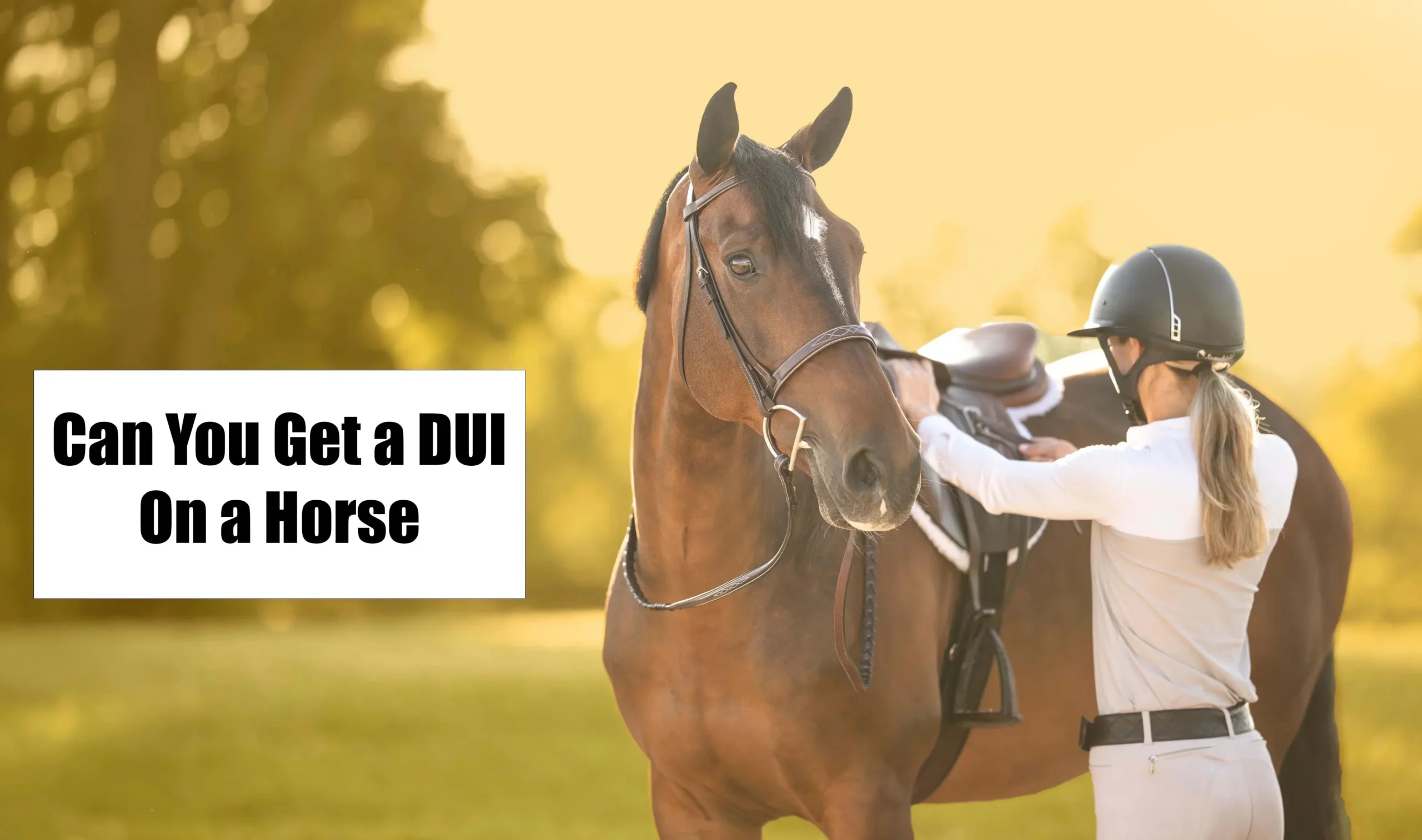Imagine this: a man rides his horse home from a bar late at night, thinking he’s avoiding the risk of a DUI. To his shock, flashing lights appear behind him, and an officer arrests him for driving under the influence. It sounds like a strange headline from a local newspaper, yet this scenario has played out in real life across several states.
So, can you get a DUI on a horse? The short answer is yes—in many states, you can. But the full story is more nuanced. Different states and even different countries interpret DUI laws differently. Some courts treat horses like vehicles, while others see them as exceptions. Either way, the consequences of riding drunk on horseback can be serious for you, your horse, and others on the road.
This guide breaks down everything you need to know: the laws, real-life cases, safety risks, and common misconceptions.
What Is a DUI and How Does It Apply to Horses?
DUI stands for Driving Under the Influence, a charge designed to stop people from operating vehicles while impaired by alcohol or drugs. At first glance, DUI laws seem meant for cars, trucks, and motorcycles. But the word “vehicle” isn’t always defined that narrowly.
- Broad interpretation: Some states classify any device used for transportation on public roads as a “vehicle.” That could include bicycles, scooters, carriages, and horses.
- Narrow interpretation: Other states only apply DUI to motor vehicles. In these places, you might escape a DUI on horseback but still face other charges.
For example, California law specifically includes “anyone riding an animal on a public roadway” under DUI statutes. Kentucky takes a similar stance, considering horses as vehicles. Meanwhile, states like Texas limit DUI laws to motorized vehicles, though riders may still face public intoxication or endangerment charges.
The inconsistency makes this a fascinating legal gray area.
Can You Get a DUI on a Horse? State Laws Compared
Since laws vary so much, it helps to look at how states handle DUI on horseback.
States Where You Can Be Charged with DUI While Riding a Horse
Several states treat horses as vehicles under DUI statutes:
- California – Vehicle Code Section 21050 applies DUI laws to anyone riding an animal.
- Kentucky – Horses are legally considered vehicles on roadways.
- Colorado – DUI laws cover horseback riders as well.
- Florida – Case law has confirmed that riding a horse drunk can result in DUI.
- Pennsylvania – The Supreme Court once ruled a horse qualifies as a vehicle for DUI.
Case Study: Florida Woman Arrested
In 2017, a 53-year-old Florida woman was arrested after police found her riding her horse on a busy highway while intoxicated.Her blood alcohol content was twice the permitted level.Officers argued that she put herself, the horse, and motorists at risk. The horse was taken to animal control, and she faced DUI charges.
This wasn’t an isolated case—it set a clear precedent in Florida.
States Where You Likely Won’t Face a DUI on a Horse
In states like Texas, Montana, and North Carolina, DUI laws specify motor vehicles only. That means you won’t be hit with a DUI while horseback riding. But that doesn’t mean you’re in the clear.
Other possible charges include:
- Public intoxication
- Animal endangerment
- Disorderly conduct
- Traffic obstruction
In these states, penalties might not be as severe as a DUI, but fines, jail time, or probation are still possible.
International Perspectives
Different countries also handle the issue uniquely:
- United Kingdom – It’s illegal to be “drunk in charge of a horse” under the Licensing Act of 1872. Riders can be fined or even jailed.
- Canada – DUI laws typically apply to motorized vehicles only, but public intoxication and animal safety laws cover horse riders.
- Australia – States like New South Wales allow charges for riding a horse drunk on public roads.
The lesson? No matter where you are, riding a horse drunk rarely ends without consequences.
Legal Loopholes and Alternative Charges
Even if you avoid a DUI charge, don’t assume you’re safe. Courts often use alternative charges when horseback riders can’t be prosecuted under DUI laws.
Common alternatives to DUI on horseback include:
- Public intoxication – Being drunk in a public place.
- Animal cruelty/endangerment – If the horse’s welfare is compromised.
- Traffic obstruction – For blocking roadways or endangering drivers.
- Reckless endangerment – When public safety is put at risk.
Here’s a quick table to summarize:
| Charge Type | Applies to Horse Riders? | Potential Penalties |
| DUI | Yes, in many states | Fines, license suspension, jail time |
| Public intoxication | Nearly everywhere | Fines, arrest |
| Animal cruelty | Select cases | Jail, probation, loss of ownership |
| Traffic obstruction | Roads/highways | Tickets, fines, points on license |
Real-Life Cases of DUI on a Horse
Kentucky Case
In Kentucky, a man was arrested after weaving along the road on horseback while visibly drunk. Officers reported he could barely stay in the saddle. He argued that “it’s just a horse,” but the law saw it differently. He faced DUI penalties similar to if he had been driving a car.
Florida Case
The Florida woman arrested on horseback became a headline story nationwide. The case highlighted how seriously police treat horseback DUIs when public safety is threatened.
Pennsylvania Case
In 2004, Pennsylvania authorities charged two men with DUI for riding horses while drunk. Courts upheld that a horse counted as a “vehicle” under state law.
Lesson learned: These cases show that law enforcement doesn’t see a horse as an escape route from DUI charges.
Safety Concerns of Riding a Horse Drunk
The legal side is just one piece of the puzzle. The practical risks of riding while impaired are just as serious.
- For the rider: Alcohol slows reflexes, clouds judgment, and increases the risk of falling off.
- For the horse: Loud traffic, sudden movements, and inconsistent cues can spook the animal, putting it in danger.
- For the public: A frightened horse can dart into traffic, causing severe accidents.
Expert Quote:
“Horses are prey animals with strong flight instincts. A sober rider can control that. A drunk rider cannot, and the consequences can be catastrophic.”
Even if charges vary, safety risks are universal.
Can You Really Treat a Horse Like a Vehicle?
This is where the legal debate gets interesting.
- Yes, it’s a vehicle: Horses transport people on public roads, much like bikes or carriages.
- No, it’s not a vehicle: A horse is a living animal, not a mechanical device, and laws should treat it differently.
Courts fall on both sides. Some judges argue that applying DUI laws to horses is essential for public safety. Others believe it stretches the definition of “vehicle” too far.
Key Takeaways – Can You Get a DUI on a Horse?
To answer the question directly: yes, in many places, you can get a DUI on a horse. Even where DUI doesn’t apply, riders often face other charges.
- DUI on horseback is possible in states like California, Kentucky, Colorado, Florida, and Pennsylvania.
- In states that restrict DUI to motor vehicles, you may still be charged with public intoxication or animal cruelty.
- Internationally, countries like the UK and Australia also penalize drunk horse riders.
- Beyond laws, riding drunk is dangerous—for you, your horse, and everyone around you.
Frequently Asked Questions (FAQ)
Can you get a DUI on a horse and buggy?
Yes. Courts often apply DUI laws to horse-drawn carriages since the buggy itself qualifies as a vehicle.
What about bicycles or e-scooters?
Most states apply DUI laws to them. Riding drunk on a bike can also get you charged.
What’s the difference between DUI and public intoxication?
DUI requires operating a vehicle while impaired, while public intoxication simply means being visibly drunk in a public place.
Can you refuse a breathalyzer on horseback?
In states where DUI applies, refusal can lead to penalties like automatic license suspension.
Do DUI penalties on a horse affect your driver’s license?
Yes. In many states, DUI on horseback carries the same consequences for your license as if you were driving a car.
Final Thoughts
Therefore, is it possible to be arrested for driving under the influence while riding a horse? The answer depends on where you are—but in many states and countries, yes, you absolutely can. Even if you dodge a DUI, alternative charges will likely follow. Beyond that, the risks to your safety, your horse’s wellbeing, and public safety make it an irresponsible choice.
Bottom line: if you’ve had too much to drink, don’t saddle up. Call a cab, phone a friend, or walk home. Just because your ride has four legs doesn’t mean the law—or common sense—won’t catch up with you.

